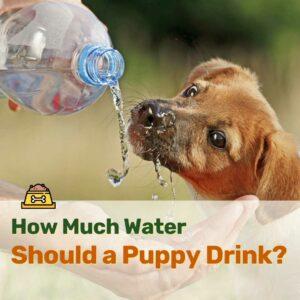Understanding how much water should a puppy drink is crucial for their health and well-being.
Puppies, just like humans, need to stay hydrated to maintain their health, but figuring out how much water they need can be tricky. It varies depending on their age, size, breed, and activity level.
In this comprehensive guide, we’ll explore 20 key questions about puppy hydration to help ensure your furry friend stays happy and hydrated.
1. How Much Water Should a Puppy Drink Based on Age?
- 6-8 Weeks Old: At this age, puppies typically wean off their mother’s milk and begin consuming solid food. It’s advisable to offer water freely, but monitor their intake as they may not drink large amounts at this stage.
- 2-3 Months Old: Puppies should have access to water at all times. Their intake might range from approximately ½ to 1 cup per day.
- 4-5 Months Old: Rapid growth occurs during these months, leading to increased water intake. They may consume around 1 to 1½ cups of water per day.
- 6-12 Months Old: As they continue to grow and become more active, their water needs increase. Expect them to require about 1½ to 2 cups of water per day.
2. What About Puppies’ Size and Breed?
- General Guideline for All Ages: Regardless of age, a standard guideline is about 1/2 to 1 ounce of water per pound of body weight per day.
- Small Breeds: Smaller breeds may need relatively less water compared to larger breeds, but they should still follow the ounce-per-pound guideline.
- Large Breeds: Larger breeds need more water. For instance, a 20-pound puppy requires between 10 and 20 ounces of water each day.
3. How Does Activity Level Affect Water Intake?
Active puppies or those living in hot climates may need more water than the standard guidelines suggest. Always ensure fresh water is available, especially after play or exercise.
4. Are There Special Considerations for Weaned Puppies?
Very young puppies (before 6 weeks old) fulfill their hydration needs from their mother’s milk. As they are weaned and start to eat solid food (6-8 weeks old), they will need a fresh supply of water, which is about one-half cup of water every two hours.
5. How Does Diet Influence Water Consumption?
Puppies on a wet food diet may drink less water, as wet food contains more moisture than dry kibble. Conversely, puppies eating mostly dry food may need more water.
6. What Role Does Water Play in a Puppy’s Body?
Water is vital for metabolic processes, including digestion, brain activity, blood flow, and breathing. It also regulates body temperature, especially in hot weather when puppies pant to cool down.
7. Can Puppies Self-Regulate Their Water Intake?
Most puppies naturally self-regulate their water consumption. However, factors like diet, health conditions, and environmental changes can affect this. Always provide access to clean water and observe their drinking habits.
8. How Do I Know if My Puppy is Dehydrated?
- Skin Elasticity Test: Gently pull the skin at the back of your puppy’s neck. If it snaps back quickly, they are well-hydrated. Slow return indicates dehydration.
- Gum Check: Press against your puppy’s gums. They should turn white and then rapidly back to pink within 2 seconds. Delayed color return suggests dehydration.
9. Should I Restrict Water During House Training?
While it’s common to remove water a few hours before bedtime to aid in house training, ensure that your puppy gets enough water during the day. As puppies are more prone to dehydration than adult dogs, they might also tend to resource guarding.
10. What If My Puppy Drinks Too Much Water?
Overhydration is rare but possible. If your puppy is drinking excessively and showing signs like bloating or vomiting, consult a vet immediately.
11. Can Puppies Drink Filtered or Bottled Water?
While tap water is generally safe, filtered or bottled water can be used, especially if your local water quality is not ideal.
12. My Puppy Doesn’t Like to Drink Water. How Can I Make Him Drink More?
- Enticing with Flavor: Adding a bit of taste to the water can encourage your puppy to drink more. Bone broth or pet-safe, low-sodium broth can be a good option.
- Avoid Sugary Additives: While some might consider adding glucose for taste, be cautious as it can lead to health issues like obesity and dental problems.
- Use Ice or Treats: Some puppies enjoy licking ice cubes. Alternatively, treats with high water content like apple or guava slices can help with hydration.
- Gradual Introduction: If your puppy is hesitant, gradually introduce flavored water or treats over time to develop a liking for it.
13. How Does the Type of Water Bowl Influence My Puppy’s Drinking Habits?
Some puppies prefer certain types of bowls, like stainless steel or ceramic. Experiment with different bowls to see if your puppy has a preference.
14. How Much Water Should I Give My Puppy During Hot Weather?
In hot weather, puppies can become dehydrated more quickly. It’s essential to increase their water intake during these times. Ensure they have constant access to fresh, cool water, and consider adding more water bowls around your living space. Also, be extra vigilant for signs of dehydration, such as excessive panting or lethargy, and provide a cool, shaded area for your puppy to rest in.
15. What Are the Risks of Not Providing Enough Water?
Dehydration can lead to serious health issues such as kidney stones, urinary tract infections, and even organ failure.
16. Is It Normal for Puppies to Drink a Lot After Vaccinations?
Yes, it’s normal for puppies to drink more water after vaccinations due to mild fever or discomfort.
17. How Do I Balance Water Intake with Potty Training?
Offer water at regular intervals and take your puppy out for frequent bathroom breaks to balance hydration with potty training.
18. How Can I Ensure My Puppy Gets Enough Water During Travel?
When traveling, maintain your puppy’s hydration by bringing a portable water bottle or bowl. Offer water during breaks and keep an eye on their intake, especially in new environments where they might be more active or stressed.
19. Should I Be Concerned If My Puppy Drinks Water Too Quickly?
Rapid drinking can lead to bloating and vomiting. Use a slow-feeder bowl to pace your puppy’s drinking.
20. Is It Safe to Add Vitamins or Supplements to My Puppy’s Water?
Before adding any vitamins or supplements to your puppy’s water, consult with your veterinarian. Puppies have specific nutritional needs, and unnecessary supplements could disrupt their dietary balance.
21. My Puppy’s Urine is Very Yellowish. Is This a Sign of Dehydration? What Happens if This Continues?
Yellowish urine in puppies can be a sign of dehydration, especially if it’s darker than usual. It could happen if puppy doesn’t like to drink the water. Adequate hydration typically results in light yellow or nearly clear urine.
If dehydration continues, it can lead to urinary tract infections, kidney stones, and other health issues. Ensure your puppy has constant access to fresh water and monitor their drinking habits.
If the dark urine persists or if you notice any behavioral changes, it’s important to consult your veterinarian for a proper assessment and guidance.
Conclusion: How Much Water Should a Puppy Drink?
Puppy hydration is a dynamic process that changes with age, size, diet, and activity level. The key is to provide constant access to clean, fresh water and monitor your puppy’s intake.
Always be vigilant for signs of dehydration and consult your vet if you’re unsure about your puppy’s hydration status. Remember, every puppy is unique, and these guidelines should be adjusted based on individual needs and circumstances.






